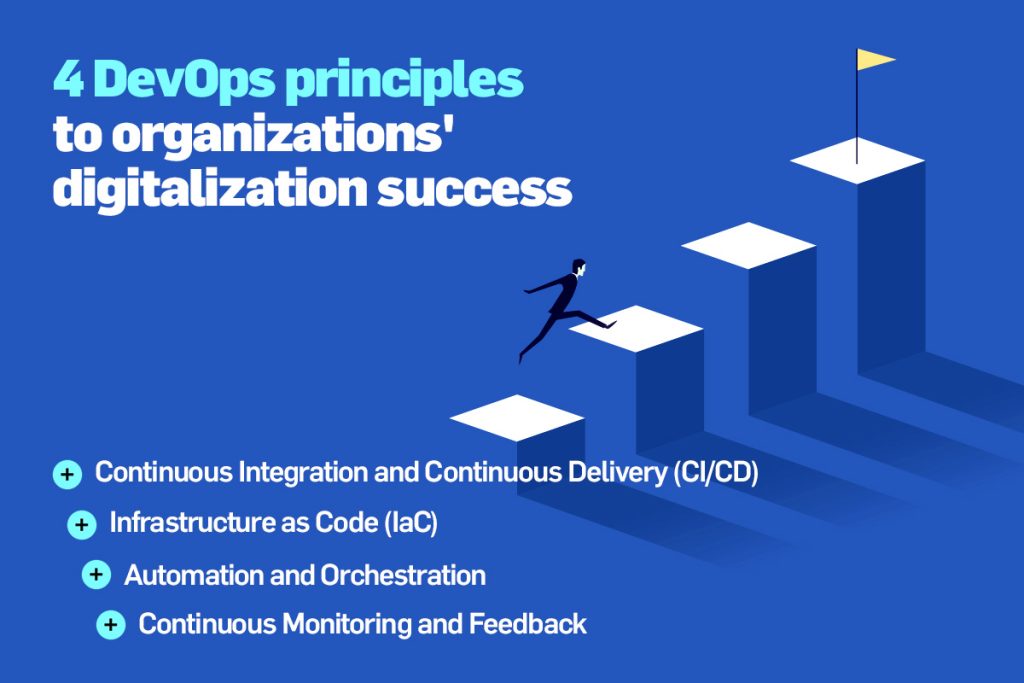2023-07-03
The 4 DevOps Principles that guide the success of digitizing organizations.
In today’s increasingly dynamic digital landscape, organizations are constantly striving to stay competitive by embracing digitization. One approach that has proven to be highly effective is adopting DevOps principles. DevOps, a combination of development and operations, provides a set of practices that facilitate fluid collaboration, automation, and rapid delivery of software solutions. Next, we explore the four DevOps principles that serve as a guiding force for the success of organizations’ digitization efforts.
Continuous Integration and Continuous Delivery (CI/CD)
Continuous Integration and Continuous Delivery (CI/CD) is a vital DevOps principle that enables companies to optimize their software development and deployment processes. By implementing CI/CD, organizations can automate the integration of code changes, testing, and deployment, ensuring a more efficient and error-free software release cycle. DevOps teams use a variety of tools and techniques to make CI/CD seamless, leading to faster time from development to release and increased customer satisfaction.
Infrastructure as Code (IaC)
Infrastructure as Code (IaC) is another key principle that promotes the use of code to manage and commission infrastructure resources. By treating infrastructure as code, companies can automate the configuration, deployment, and management of their infrastructure, resulting in improved scalability, reproducibility, and consistency. IaC eliminates manual configuration and enables version control, making it easy to track changes and revert to previous configurations if needed.

Automation and Orchestration
Automation and orchestration lie at the heart of DevOps principles. Automation involves using tools and technologies to automate repetitive tasks such as testing, deployment, and monitoring. This allows DevOps teams to focus on more strategic initiatives and reduces the risk of human error. Orchestration refers to the coordination and management of multiple automated tasks to ensure a smooth and efficient workflow. By automating and orchestrating various processes, companies can achieve greater efficiency, faster delivery cycles and improved collaboration between development and operations teams.
Continuous Monitoring and Feedback
Continuous Monitoring and Feedback is a crucial DevOps principle that emphasizes the importance of real-time monitoring and feedback cycles. By implementing comprehensive monitoring systems, companies can proactively identify issues, track performance metrics, and ensure optimal system health. Continuous monitoring enables teams to detect errors, remediate issues promptly and make data-driven decisions for process improvement. In addition, feedback loops between development, operations and end users facilitate iterative improvements and promote a culture of continuous learning and innovation.
In conclusion, adopting the four DevOps principles is essential for organizations aiming for success in their digitization journey. These principles enable organizations to achieve faster development cycles, improved collaboration, increased scalability, and improved operational efficiency.
Where is your organisation in this journey?
At htss, we understand the importance of DevOps in the digitization process. We offer a complete ecosystem of software solutions that align with DevOps principles, helping organizations accelerate their digital transformation initiatives. By using state-of-the-art tools, organizations can discover new possibilities and easily achieve their digitization goals.
Keep in mind that DevOps adoption is not just about implementing tools and technologies; it’s a cultural shift that promotes collaboration, agility, and innovation. By adopting the four DevOps principles, organizations can begin a successful digitization journey that will propel them forward in today’s highly competitive business landscape.
htss offers a complete ecosystem of software solutions that can help organizations in their digitization process.




